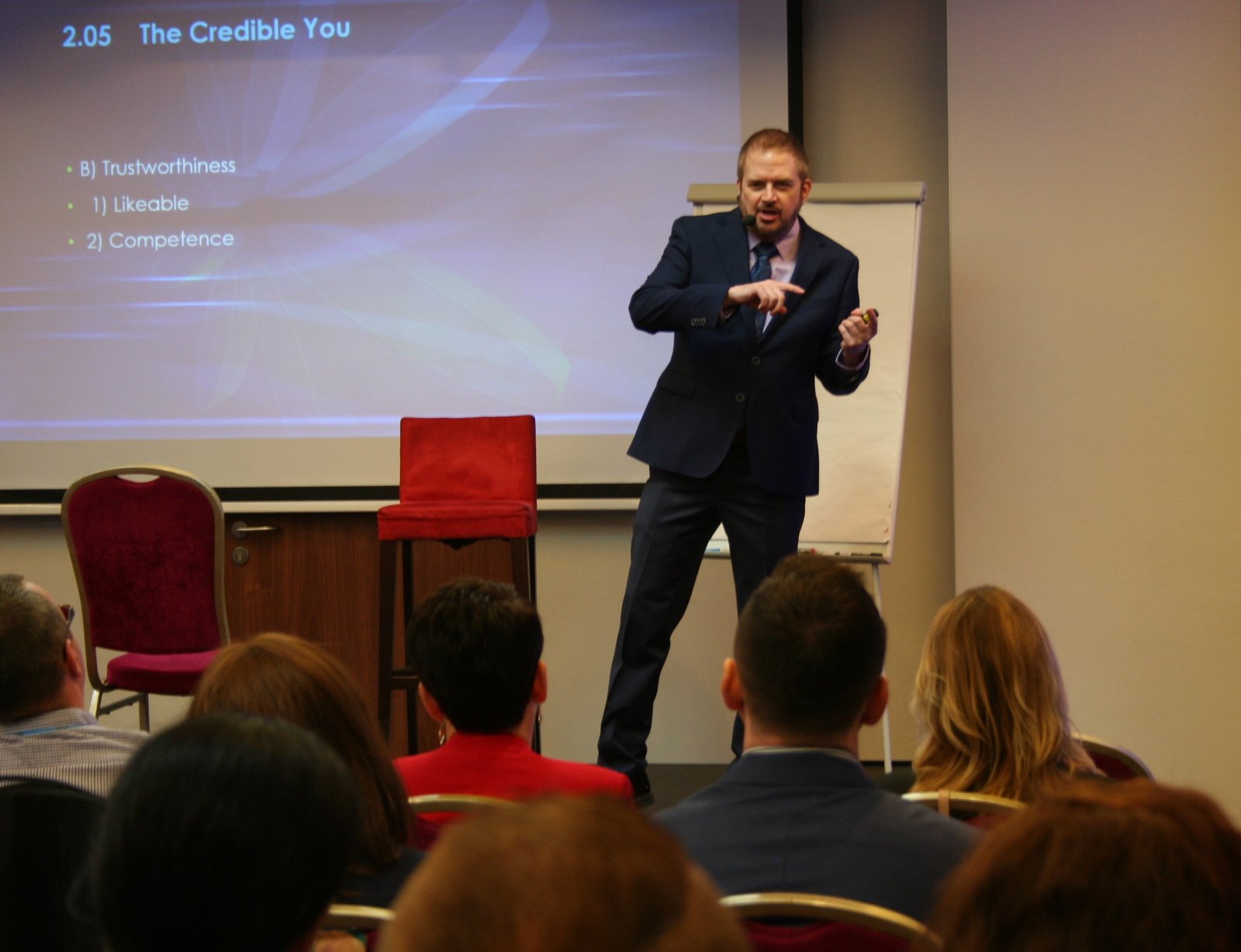
People love doing it to me:
“Kevin, what is ‘selling’ – in two words?”
-Jeffrey Gitomer
“Kevin, is marketing the true face of magic?”
-Ben Mack
“Kevin, what is the single most important factor in persuasion?”
-Mark Joyner
All in the same lifetime…
People love asking me questions for which they have an answer in the moment and then blow me away with it…
(I’ll share with you the answers to the questions Jeffrey, Ben, and Mark posed me later in this article.)
It was Mark’s question that got me going for this article.
You can know all the techniques, strategies, and mental linguistics on the planet, but if you aren’t a person of influence then you haven’t got a chance. Similarly, you can be a person of influence, but your client quite simply might not be motivated to change (at least not yet!).
Let’s look at both of the people in the process and find out what kind of a person a person of influence is…then find out what your client must feel about you to best be motivated by you….
First: What is influence?
Influence is a process where one person motivates another person to change something.
In the online event I did for Mark, he answered… “framing.” I could hardly disagree that indeed, that is the single most important implementable tactic or strategy in influence.
It is.
But, there is something more IMPORTANT in long-term successful influence BY you or me other than framing.
Something more important than the context, the environment as well…
Let’s look at just what it takes to motivate that person and who the person of influence needs to be to accomplish persuasion.
Just Who is the Person of Influence?
Who is the great salesman, the great therapist, the great lover, the great President, the great…you get the idea….
There are a number of qualities and characteristics that are crucial to success in persuasion and influence…in every usage from therapy to selling. Above all else is one characteristic that dwarfs all of the rest… Empathy.

Nothing is more important than empathy for someone who wants to motivate others to change.
What is Empathy?
It’s the ability to feel, to understand, to walk a mile in their shoes… Empathy means that you can feel and see life from the perspective of the other person. If and when you can do that – you can be influential. If you can’t, you will only be able to “close a percentage” or get lucky now and then. You can know all the techniques on the planet, but if you can’t feel their pain, you will never truly be a great salesman, a great communicator, a powerful person of influence.
You walk into the hospital, see your loved one with the I V in their arm. You paste a smile on your face, but they know it hurts you as much as it does them.
That’s empathy.
Your child is home sick from school. You feel as bad for them as they feel. You see the result of their bad decisions and the pain of the future they now face. You feel it too.
When I think of empathy, I think of people like former President Clinton. He has far more empathy than most people in the public eye. Politics aside, when you watched Clinton with people, you sensed he could really be in that person’s shoes…and he was. That means he has the capacity to identify and feel what others are feeling at this moment. People of great empathy have three common traits:

- They have experienced pain first hand.
- They have a wide range of experiences with all kinds of other people.
- They are validated and feel good based upon the approval of others.
I saw a book on the shelf today at Barnes & Noble. It was called “Disease to Please.” I didn’t pick it up. Why? The person doesn’t get it. (Just like the guy who wrote “Don’t Sweat the Small Stuff. It’s All Small Stuff.”) The book might be helpful, but the title spreads a very bad idea virus.
In a broad sense, the ideal life is about two things: Giving and receiving pleasure. (Pleasure broadly meaning anything that is good.) Take away one of the two (giving or receiving) from the person, and you have a half of a person…
…take away the giving part, and in the vernacular, you have a jerk.
I’ll bet a nickel that the author of “Disease to Please” will tell the reader that the reason people are unhappy and unsatisfied is that they are trying to please other people at their own expense (and that might be a fact). The possible solution might be proposed to stop trying to please others, and start doing what the reader has never done perhaps…please themselves.
Problem.
As soon as the person stops being helpful, kind, loving, supportive, and nurturing to others, they lose the other half of who they were. The half of them that IS powerful and useful.
 The real solution, obviously, is to always be supportive, kind, and helpful. And then to be supportive, kind, and helpful to yourself as well. (This requires no more time or effort. A simple set of choices.) Then, instead of becoming a jerk, they become a complete person and a person capable of powerful influence…which means they are only one step away from success at any level they choose.
The real solution, obviously, is to always be supportive, kind, and helpful. And then to be supportive, kind, and helpful to yourself as well. (This requires no more time or effort. A simple set of choices.) Then, instead of becoming a jerk, they become a complete person and a person capable of powerful influence…which means they are only one step away from success at any level they choose.
The influential person has a strong desire to please and if they are going to be influential, that extends to the desire to help (for both altruistic and selfish purposes) others be happy, feel better, and be useful as a human. This desire to help, to create value, and to love will often be paired with some kind of pain and no one should tell this person to try and squelch the feelings of being rebuffed, rejected, or hurt. That IS the healthy and normal response. These are the feelings that generate the empathic response.
When people see these characteristics in you, they judge you as a person who cares, who is interested and a person that wants to help others. A person of kindness. There are plenty of exceptions in history, but in general if a person is empathic and kind, they have the potential to help others create change.
Why?
Because you won’t listen to a jerk. Jerks don’t care. All they have is their self-interest and that means you CANNOT trust them as they attempt to persuade. It’s as simple as that.
The Cornerstone of Motivation
Question: Can a person of influence – someone with great empathy – also be intense, tough-as-nails, focused, able to self-satisfy at many levels? Of course. People are allowed to have as many characteristics as they can…empathy is simply the cornerstone of motivating others.
Legend Point: If you are empathetic, you will have the instant reservoir to tap into to create change in other people’s lives. This doesn’t mean you will successfully utilize your reservoir, it just means that you don’t have to work on building it!
So what is the big deal with something as touchy feely as empathy? Well, if you’re truly wondering, then it would be useful to begin working on empathy.
We all want to be understood and liked by others. People who are empathetic make it a point to understand others and to look out for the interests of everyone.
Salespeople, take a lesson from the great therapist (who truly is a great salesperson). Numerous studies reveal that 50% of the results they achieve with a client at the one year point of demarcation is due to the therapist’s personal qualities, of which the most crucial is empathy. The remaining causes of success in therapy are spread out among the approach, the client’s motivation, their environment, etc.
When I say that people don’t buy the product or service and that they are buying YOU, I’m not kidding.
In the most simple terms: Your client is buying the empathy they feel in you.

There is little or no resistance toward the salesperson (or therapist) that has the complete best interest of the client in their heart and mind.
What About the Client?
We can talk more about the salesperson (therapist!) in a bit. For now, let’s switch to the other side of the table. The client.
The client, whether a prospect in a sales context, or a person needing therapy… the elements are identical. In order for you to motivate your client, your client will need to meet several criteria.
 Your client must be capable of changing or taking action. This simply means that they can literally do something if they chose it. You can try selling an airplane to a guy who can’t afford a matchbox car but he won’t be able to take action.
Your client must be capable of changing or taking action. This simply means that they can literally do something if they chose it. You can try selling an airplane to a guy who can’t afford a matchbox car but he won’t be able to take action.
Your client must be ready to change or take action. Remember that most people are mired in the status quo. The client who smokes or drinks too much, who doesn’t have an interest in changing isn’t likely to be motivated to change. Similarly the prospect who really believes that he doesn’t need to invest his money or buy a car that will get his family safely from point to point will need to be motivated to get to the “ready” stage. A person is ready when it is the most important thing to them and whatever they were holding onto previously becomes secondary.
People don’t like giving up anything. Attitudes, beliefs, feelings, emotions, thoughts, ANYTHING. People want to hang onto what they are familiar with.
People say they want to quit smoking…and “part of them” probably does…but it isn’t as important as what they are getting from the experience itself. The person is ready to make a change when they have shifted their priorities.
The client must be willing to change. Do they want “it” at all? If it doesn’t hit their radar, then you haven’t experienced a client that even wants to make a change. They see no reason. They feel nothing. And…nothing will happen as a result.
Your client will need to be approached in a fashion that will trigger change. The “approach” will vary from person to person. Over the years, salespeople have learned that high pressure simply created enemies and can destroy the relationship. Thirty years ago, various therapeutic styles fell into the category of being confrontational (direct challenges to the client). Although these styles might work with a specific individual, overall they were a miserable failure. For the most part, confrontation failed.
Similarly, extremely high pressure challenges fail in other influential settings. Tell someone that if they don’t buy the car today that they lose out…well everyone knows the car will still be there tomorrow and it is NOT going UP in value as it sits on the lot (the new home might, though!).
As a rule, the vast majority of people DO need to feel some discomfort to take action but they normally don’t have to feel the fires of Hades to make a good decision.
Think of it this way: Your client will not respond to high pressure if it makes no sense to be pressured. A successful person of influence simply doesn’t need one person’s “sale” that badly. And it will all show in the approach.

Observe:
“If you don’t buy this today you will have wasted my time and it cost me a lot of money to be here for you and if you did this the way it is you’d get rich and what are you thinking?!?!!?”
That said, if the salesperson is in poverty, and if they don’t make the sale, then they (the salesperson) loses. This means the salesperson is selling the wrong product for the client and salesperson.
However…
“Whether you participate or not is fine with me. I’m happy to help you here today. I’m busy. I might have a chance to help you in the future, but you must make a decision that is best for you.”
If you use the Science of Influence, you don’t have to even think about “closing the sale” anymore. It happens because it has to happen. You might need to respond to questions or even natural hesitation and fears of the unknown, but there is no more need for story-telling “closes” or emotional torture of people who could choose to become clients. It didn’t work in the therapist’s office, and it won’t work for most clients. (And if it did, is that *who* you want to be!??!!?)
The successful person of influence is the person who has great empathy for the other person. They are inherently kind. They certainly can be disciplined in approach. They can be tough as nails or as soft as a kitten. One thing is certain: They can feel the other person’s pain….and… they want to help them feel better.
As for the client, make sure you are speaking to the person who is capable of changing. The person who is ready to change and the person is willing to change. You can influence the willingness to come closer to ready (as in NOW) but you can’t motivate actual ability. If they can’t buy the million dollar house, don’t try and sell it to them. What would the point be?
Empathy and kindness.
Who would have thought it?
Oh!!
The answer to Jeffrey’s question was… “Ask Questions.”
And Ben Mack certainly believes… that marketing is the face of magic, but I’m just not sure how to counter-propose thoughts in that one….so I simply agreed with him…which I knew would make him believe that I, too, am a genius…
Where can you get more of the most innovative and cutting-edge influence and persuasion strategies and tactics?
Covert Influence: Hidden Persuaders They
(Your Competition) Don’t Want You to Have
I want to show you one of the most surprising and perhaps one of the most uncomfortable….and powerful phenomenon in Covert Influence. In fact, I want to share with you all the latest research available (well, almost all…!)
Influence Without Resistance. What’s the Key Factor? You’ll have most amazing, truly stunning tactics in predicting what and how your client (spouse, child, customer, read: anyone) will choose. Thus, you are a step ahead of anyone else in implementing the most powerful phenomena in consumer research today. Find out with this program!
Creating Irresistible Impulse. The button is there (for everyone); it just needs to be pushed. What are some of the irresistible impulses marketers are using on you? How can you take advantage of these tactics yourself? It’s all here in this section. Kevin details the marketing phenomenon that pushes the buttons…all the way to irresistible.
Tapping into Human Desires & Emotions. With just ONE change in strategy, a non-profit organization can get 5 times the donations. What can this strategy do for you? You can’t afford NOT to implement this tactic now.
Desires and Emotions… That Influence. You’ve heard some rumors, I’m sure about negative emotions and positive emotions in the influence process. But do you know what actually works, and what to emphasize in the process, and when? Find out once and for all!
Tribes. You’ve heard the term. What does it describe? How does it come into play in the influence process? Most important, how do you utilize the concept of the Tribe in order to make more sales? It’s all here… Kevin explains about subgroups and how to make appeals based on whether a group is “in” or “out”. This is cutting edge research that benefits you.
Covert Influence…to Control Behavior. You’ve seen the signs. Above the candy jar, tacked to the break room wall. Even posted on a fence, or highway. How do signs really influence? What elements should be used in signs to covertly control behavior? Fascinating new research uncovered for you!
Get Your Copy Today
Covert Influence: Hidden Persuaders






















